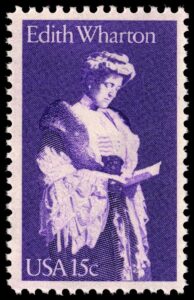Edith Wharton and her broken heart
So, without much further ado, a story about Edith Wharton. By 1905, Edith had already made a name for herself as an author. You may have read some of her books and poems although, in this day and age, it isn’t likely. Many of her works were made into films in the 1920’s and 1930’s. Probably the most notable modern adaptation would be “The Age of Innocence” released in 1993 directed by Martin Scorsese.
April 29, 1885, at age 23, Wharton married Edward (Teddy) Robbins Wharton, who was 12 years her senior. Teddy suffered from depression, so much so that Teddy and Edith pretty much ceased all activity and rarely left their home. Prior to her marriage Edith had traveled extensively. Edith fell into a deep depression herself. So what’s a girl to do?
Have an affair, of course. She hooked up with another writer named William Morton Fullerton who she believed was her soulmate. She feel madly in love. Then in 1908 Fullerton disappeared. Vanished. Ghosted her.
Between 1908 and 1913 spent most her time looking for him. She sent out hundreds of letters which were never answered.

She gave up on Fullerton and on the idea of love and moved to France where she wrote and spent her time gardening. She would become the first woman to win a Pulitzer Prize for “The Age of Innocence” in 1921 and three Nobel Prize nominations before her death in 1937.
Fullerton, it turns out, was alive. He wanted nothing to do with Edith and he did nothing with his life. He did, however, save her letters (over 400 of them) which were eventually published as a book named “Hell Hath No Fury: Women’s Letters From the End of the Affair.”
She described her feelings recounting a dream she had here:
She gave up on Fullerton and on the idea of love and moved to France where she wrote and spent her time gardening. She would become the first woman to win a Pulitzer Prize for “The Age of Innocence” in 1921 and three Nobel Prize nominations before her death in 1937.
Fullerton, it turns out, was alive. He wanted nothing to do with Edith and he did nothing with his life. He did, however, save her letters (over 400 of them) which were eventually published as a book named “Hell Hath No Fury: Women’s Letters From the End of the Affair.”
She described her feelings recounting a dream she had here:

A pale demon with black hair came in, followed by four black gnome-like creatures carrying a great black trunk. They set it down and opened it, and the Demon crying out, ‘Here’s your year—here are all the horrors that have happened to you, and that are still going to happen!” dragged out a succession of limp black squirming things and threw them on the floor before me…I knew what they were: the hideous, the incredible things that have happened to me in this dreadful year, or were to happen to me before its close; and I stared, horror-struck, as the Demon dragged them out, more and more, till finally, flinging down a blacker, hatefuller one, he said laughing, ‘There—that’s the last of them.’
“The gnomes laughed too; but I, as I stared at the great black pile and at the empty trunk, I said to the demon, ‘Are you sure it hasn’t a false bottom?’”
Eventually she gave up on Fullerton and on the idea of love and moved to France where she wrote and spent her time gardening. She would become the first woman to win a Pulitzer Prize for “The Age of Innocence” in 1921 and three Nobel Prize nominations before her death in 1937.
Fullerton, it turns out, was alive. He wanted nothing to do with Edith and he did nothing with his life. He did, however, save her letters (over 400 of them) which were eventually published as a book named “Hell Hath No Fury: Women’s Letters From the End of the Affair.”
One of her letters written in 1910″
Don’t think I am “fâchee,” as you said yesterday; but I am sad & bewildered beyond words, & with all my other cares & bewilderments, I can’t go on like this!
When I went away I thought I shd perhaps hear once from you. But you wrote me every day—you wrote me as you used to three years ago! And you provoked me to answer in the same way, because I could not see for what other purpose you were writing. I thought you wanted me to write what was in my heart!
Then I come back, & not a word, not a sign. You know that here it is impossible to exchange two words, & you come here, & come without even letting me know, so that it was a mere accident that I was at home. You go away, & I seem not to exist for you. I don’t understand.
If I could lean on some feeling in you—a good & loyal friendship, if there’s nothing else!— then I could go on, bear things, write, & arrange my life…
Now, ballottée [tossed] perpetually between one illusion & another by your strange confused conduct of the last six months, I can’t any longer find a point de repère [landmark]. I don’t know what you want, or what I am! You write to me like a lover, you treat me like a casual acquaintance!
Which are you—what am I?
Casual acquaintance, no; but a friend, yes. I’ve always told you I foresaw that solution, & accepted it in advance. But a certain consistence of affection is a fundamental part of friendship. One must know á quoi s’en tenir [what to hold on to]. And just as I think we have reached that stage, you revert abruptly to the other relation, & assume that I have noticed no change in you, & that I have not suffered or wondered at it, but have carried on my life in serene insensibility until you chose to enter again suddenly into it.
I have borne all these inconsistencies & incoherences as long as I could, because I love you so much, & because I am so sorry for things in your life that are difficult & wearing—but I have never been capricious or exacting, I have never, I think, added to those difficulties, but have tried to lighten them for you by a frank & faithful friendship. Only now a sense of my worth, & a sense also that I can bear no more, makes me write this to you. Write me no more such letters as you sent me in England.
It is a cruel & capricious amusement. —It was not necessary to hurt me thus! I understand something of life, I judged you long ago, & I accepted you as you are, admiring all your gifts & your great charm, & seeking only to give you the kind of affection that should help you most, & lay the least claim on you in return. But one cannot have all one’s passionate tenderness demanded one day, & ignored the next, without reason or explanation, as it has pleased you to do since your enigmatic change in December.
I have had a difficult year—but the pain within my pain, the last turn of the screw, has been the impossibility of knowing what you wanted of me, & what you felt for me—at a time when it seemed natural that, if you had any sincere feeling for me, you should see my need of an equable friendship—I don’t say love because that is not made to order!—but the kind of tried tenderness that old friends seek in each other in difficult moments of life. My life was better before I knew you. That is, for me, the sad conclusion of this sad year. And it is a bitter thing to say to the one being one has ever loved d’amour.



